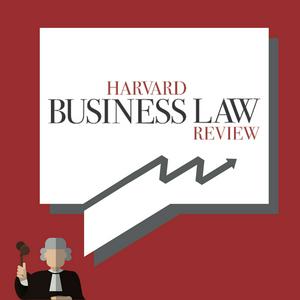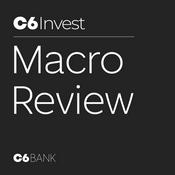9 episódios

High-End Securities Regulation (Update): William Clayton
18/11/2024 | 41min
We interview William Clayton on the SEC’s private funds rulemaking and related litigation. Professor Clayton lays out his views on agency conflicts in the high-end private funds securities contracting market, discusses the Fifth Circuit’s recent decision in National Association of Private Fund Managers v. SEC (5th Cir. 2024), and offers some thoughts looking forward beyond the presidential election. A bit about William Clayton: William W. Clayton is Professor of Law at The J. Reuben Clark Law School of Brigham Young University, where he co-directs the Global Business Law Program and teaches courses on contracts, business organizations, and corporate finance. He is a leading researcher on private markets and private equity funds contracting and governance, whose work has been cited extensively in agency rulemaking and litigation amicus briefs, as well as published in other journals such as the Yale Journal on Regulation and Vanderbilt Law Review. Before joining the BYU Law faculty, Professor Clayton worked as a corporate lawyer at Wachtell-Lipton, and as a private funds lawyer at Simpson-Thacher in New York, and was Executive Director of the Yale Law School center for the study of Corporate Law. Professor Clayton holds a J.D. from Yale Law School, and an M.B.A. and B.A. from Stanford University. We were pleased to publish Professor Clayton's article High-End Securities Regulation: Reflections on the SEC's 2022-23 Private Funds Rulemaking in the Harvard Business Law Review last fall. Now, given subsequent litigation and regulatory updates including National Association of Private Fund Managers v. SEC (5th Cir. 2024), we are thrilled to welcome him to the Harvard Business Law Review Podcast to discuss current events.

Corporate Purpose: Leo Strine
17/9/2024 | 55min
We interview Leo Strine on the purpose of the corporation, differentiating between shareholder primacy and stakeholder theory. We discuss ESG and the power of stockholders and workers. Leo Strine applies his perspective on corporate purpose to corporate acquisitions and lays out his hopes for the future of corporations. Some critical articles to learn more about the shareholder primacy vs stakeholder theory debate:Origins of the argument: - Merrick Dodd, For Whom Are Corporate Managers Trustees?, 45 HARV. L. REV. 1145 (1932) - Adolph A. Berle, Jr., For Whom Corporate Managers Are Trustees: A Note, 45 HARV.. L. REV. 1365, 1372 (1932)Shareholder primacy ownership argument: - Milton Friedman, A Friedman doctrine– The Social Responsibility of Business Is to Increase Its Profits, N.Y. Times, Sept. 13 1970.Critique on shareholder primacy: - Lynn A. Stout, Bad and Not-so-Bad Arguments for Shareholder Primacy, 75 S. CAL. L. REV. 1189 (2002).Example of Application: - Lucian Bebchuk and Roberto Tallarita, The Illusory Promise of Stakeholder Governance. 106 Corn. L. Rev. 91 (2020).Example of Court Case Application: - Revlon, Inc. v. MacAndrews & Forbes Holdings, Inc., 506 A.2d 173, 177 (Del. 1986)A bit about Leo Strine:Leo E. Strine, Jr., is Of Counsel in the Corporate Department at Wachtell, Lipton, Rosen & Katz. Prior to joining the firm, he was the Chief Justice of the Delaware Supreme Court from early 2014 through late 2019. Before becoming the Chief Justice, he served on the Delaware Court of Chancery as Chancellor since June 22, 2011, and as a Vice Chancellor since November 9, 1998.In his judicial positions, Mr. Strine wrote hundreds of opinions in the areas of corporate law, contract law, trusts and estates, criminal law, administrative law, and constitutional law. Notably, he authored the lead decision in the Delaware Supreme Court case holding that Delaware’s death penalty statute was unconstitutional because it did not require the key findings necessary to impose a death sentence to be made by a unanimous jury.For a generation, Mr. Strine taught various corporate law courses at the Harvard and University of Pennsylvania law schools, and now serves as the Michael L. Wachter Distinguished Fellow in Law and Policy at the University of Pennsylvania Carey Law School and a Senior Fellow of the Harvard Program on Corporate Governance. From 2006 to 2019, Mr. Strine served as the special judicial consultant to the ABA’s Committee on Corporate Laws. He also was the special judicial consultant to the ABA’s Committee on Mergers & Acquisitions from 2014 to 2019. He is a member of the American Law Institute.Mr. Strine speaks and writes frequently on the subjects of corporate and public law, and particularly the impact of business on society, and his articles have been published in The University of Chicago Law Review, Columbia Law Review, Cornell Law Review, Duke Law Journal, Harvard Law Review, University of Pennsylvania Law Review, and Stanford Law Review, among others. On several occasions, his articles were selected as among the Best Corporate and Securities Articles of the year, based on the choices of law professors.Before becoming a judge in 1998, Mr. Strine served as Counsel and Policy Director to Governor Thomas R. Carper, and had also worked as a corporate litigator at Skadden, Arps, Slate, Meagher & Flom from 1990 to 1992. He was law clerk to Judge Walter K. Stapleton of the U.S. Court of Appeals for the Third Circuit and Chief Judge John F. Gerry of the U.S. District Court for the District of New Jersey. Mr. Strine graduated magna cum laude from the University of Pennsylvania Law Sc

Leadership, Design Thinking & Legal Profession: Scott Westfahl
04/9/2024 | 58min
We Interview Scott Westfahl on leadership and critical lessons that he learned from his father– a former captain on a nuclear submarine. Professor Westfahl then explains design thinking and how it helps and can be harnessed by teams. He then discusses the legal profession, education, and dealing with uncertainty. Professor Westfahl concludes by analyzing a proposed case in which a firm notices that high performing associates have behavioral issues. A bit about Scott Westfahl:Prof. Westfahl is the Director of Harvard Law School Executive Education and also teaches courses on leadership and design thinking and innovation within the law school’s J.D. curriculum. In 2024, his Legal Innovation Through Design Thinking course was recognized by Bloomberg Law as one of the law school innovations of the year. He oversees and teaches global leadership and design thinking for legal leaders from firms, government, and the judiciary. He focuses his Executive Education teaching and writing on leadership, teams, talent development as strategy, design thinking and driving innovation and organizational alignment from a talent management and diversity and inclusion perspective.Before HLS, Professor Westfahl was the Director of Professional Development at the law firm Goodwin Procter LLP. In 2008, Professor Westfahl was chosen as one of Law Firm, Inc. magazine’s five “Innovators of the Year” for his development of a cutting edge attorney assignment system and database called iStaff, which effectively ties attorney work assignments to their professional development needs. Professor Westfahl is the author of the book You Get What You Measure: Lawyer Development Frameworks and Effective Performance Evaluations (NALP, 2008).Prior to his work at Goodwin Procter, Professor Westfahl spent six years leading professional development for the Washington, D.C. office of McKinsey & Company. Professor Westfahl earned his J.D. from Harvard Law School in 1988, and is a graduate from Dartmouth College.

Litigation & Advancing the Rule of Law: Judge Karen Green
16/4/2024 | 44min
Judge Green begins by discussing white collar criminal litigation, internal investigations, and the challenges that corporations face in preventing their employees from committing fraud. She then discusses prosecutorial discretion and the impact that her practice had on her perspective as a judge. Judge Green then shares an exciting and complex case that she was involved with. The interview concludes with a discussion about advancing the rule of law. Judge Karen F. Green is an attorney with more than forty years of experience investigating, litigating and resolving civil and criminal disputes. From 2016 to 2022, she was an Associate Justice of the Massachusetts Superior Court, where she handled cases alleging serious felonies in criminal trial sessions and complex civil disputes in the Business Litigation Session. Prior to her judicial appointment, Green was a partner at WilmerHale, where her practice concentrated on complex business litigation, including the defense of government investigations and white-collar, criminal litigation. Judge Green co-chaired WilmerHale's Litigation Department, was a member of its Executive Committee, and chaired legacy Hale and Dorr’s Litigation Department. Earlier in her career, she was Deputy US Attorney for the federal District of Massachusetts, Chief of Staff to the Governor of Massachusetts, and an assistant US attorney. Judge Green has served as President of Litigation Counsel of America and on the boards of numerous other organizations, including the ABA’s Center for Human Rights, CareGroup, Inc., Massachusetts Eye and Ear, Justice Bridge, and Fiduciary Trust Company. A 2015 Fellow of Harvard University’s Advanced Leadership Initiative, she is a graduate of Harvard Law School and Harvard-Radcliffe.

Negotiations: Sheila Heen
19/12/2023 | 48min
We interview Sheila Heen on negotiation and difficult conversations. The talk includes practical advice, understanding the role of identity, discussions on the research behind "anchoring," analyzing a scenario, and more. A bit about Sheila Heen:Sheila Heen is the Thaddeus R. Beal Professor of Practice at Harvard Law School and serves as a Deputy Director of the Harvard Negotiation Project.Prof. Heen specializes in particularly difficult negotiations – where emotions run high and relationships are strained. She is also a co-author of two New York Times bestsellers, "Difficult Conversations: How to Discuss What Matters Most" and "Thanks for the Feedback: The Science and Art of Receiving Feedback Well." She has written for the Harvard Business Review, and the New York Times as a guest expert, and as a Modern Love columnist. Prof. Heen is also a Founder of Triad Consulting Group, a corporate education and consulting firm that serves clients on six continents. Her corporate clients have included Pixar, the NBA, and Ford, to name a few. She often works with executive teams, helping them to work through conflict, repair working relationships and make sound decisions together. In the public sector she has also provided training for the New England Organ Bank, the Singapore Supreme Court, the Obama White House and theologians struggling with disagreement over the nature of truth and God.Prof. Heen is a graduate of Occidental College and Harvard Law School. She was also my professor.
Mais podcasts de Negócios
Podcasts em tendência em Negócios
Sobre Harvard Business Law Review
Ouça Harvard Business Law Review, Jota Jota Podcast e muitos outros podcasts de todo o mundo com o aplicativo o radio.net

Obtenha o aplicativo gratuito radio.net
- Guardar rádios e podcasts favoritos
- Transmissão via Wi-Fi ou Bluetooth
- Carplay & Android Audo compatìvel
- E ainda mais funções
Obtenha o aplicativo gratuito radio.net
- Guardar rádios e podcasts favoritos
- Transmissão via Wi-Fi ou Bluetooth
- Carplay & Android Audo compatìvel
- E ainda mais funções


Harvard Business Law Review
baixe o aplicativo,
ouça.







































